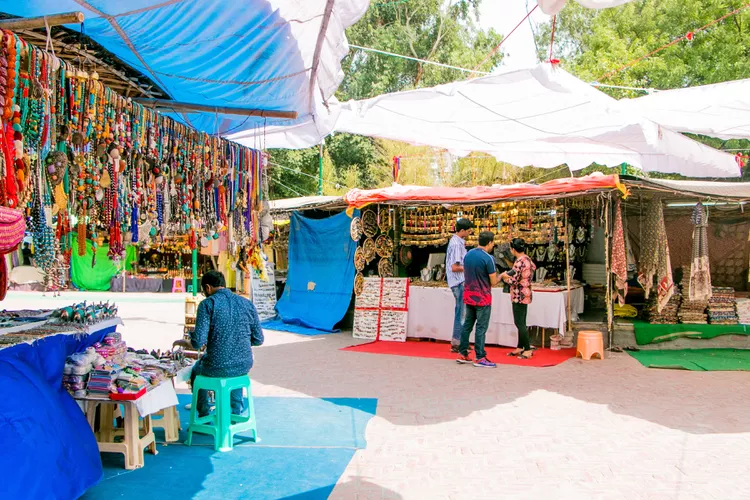Summary
When it comes to shopping in India, Delhi is the place. The city boasts a multitude of markets featuring a diverse array of handicrafts and unique items from across the country. One of the most renowned markets, Dilli Haat, was established by the government to provide artisans with a platform to sell their creations. This market offers the feel of a traditional weekly village market, known as a haat, complete with cultural performances and authentic Indian cuisine, making it a hugely popular destination.
Dilli Haat Locations
There are three Dilli Haat markets in Delhi:
- The original six-acre Dilli Haat opposite INA Metro Station (Yellow Line) in south Delhi, established in 1994.
- The 7.2-acre Dilli Haat near Netaji Subhash Place Metro Station (Red Line) at Pitampura, in north Delhi, established in 2008.
- The newest and largest 9.8-acre Dilli Haat on Lal Sain Mandir Marg at Janakpuri, near Tikak Nagar Metro Station (Blue Line), inaugurated in early July 2014.
Which Dilli Haat Should You Visit?
In this scenario, the original Dilli Haat is the best choice. Although the newer markets are larger, they have not successfully replicated the unique ambiance or success of the original INA Dilli Haat. Consequently, these newer locations often feel underutilized and lack the same variety of handicraft and food stalls. While the Dilli Haat at Janakpuri offers more activities than Pitampura, both locations are relatively quiet unless visited on weekends or during festivals.
Dilli Haat Features
Each Dilli Haat showcases a unique design, yet they all feature handicraft stalls that host artisans on a rotational basis, a few permanent shops, and a vibrant food court serving diverse Indian cuisine. For instance, the momos from northeastern India at INA Dilli Haat are among the city’s finest.
Dilli Haat at Pitampura includes additional attractions such as a spice market, an art gallery, and sculpture displays.
On the other hand, Dilli Haat at Janakpuri was developed as a source of entertainment for local residents, with a distinct focus on music. Its special features include a music library and a dedicated museum showcasing Indian musical instruments. Moreover, interactive performance spaces are a significant highlight, complemented by a large amphitheater, an air-conditioned auditorium, and an exposition hall for exhibitions and workshops.
Tourists exploring near Janakpuri Dilli Haat will discover off-beat attractions such as Kumhar Gram Potter’s Village, Tihar Food Court, and King’s Park Street. Tihar Food Court on Jail Road is particularly notable as it is managed by Tihar Jail inmates, representing an inspiring rehabilitation initiative. Additionally, King’s Park Street, located about 15 minutes from Janakpuri Dilli Haat, serves as a cultural hub born from a revitalized urban wasteland. Visitors can also find one of Delhi’s finest boutique hotels in Janakpuri.

What Can You Buy at Dilli Haat?
The stalls at the haats rotate every 15 days, ensuring a fresh selection of handicrafts. However, many stalls sell similar items, making them less unique. Popular purchases include bags, cushion covers, embroidered and woven fabrics, wood carvings, shoes, carpets, saris, ethnic wear, leather goods, jewelry, and paintings. Remember to haggle to secure the best prices. You can learn bargaining tips for Indian markets to enhance your shopping experience.
Unfortunately, the presence of inexpensive imported Chinese goods in Dilli Haat is growing, which is a concerning trend. This situation arises as more stalls are being occupied by middlemen and traders rather than authentic artisans.
If you’re specifically interested in unique handicrafts, you may find the offerings at Dastkar Nature Bazaar, located about 30 minutes south of INA Dilli Haat, more appealing. This venue, near Qutub Minar and Mehrauli Archeological Park, features a new theme each month, showcasing a variety of artisans and craftsmen, alongside permanent handicraft and handloom stalls.
Festivals and Events at Dilli Haat
Each Dilli Haat hosts regular festivals, including the Great Indian Food Festival in January, Baisakhi Festival in April, Summer Festival in June, International Mango Festival in July, and Teej Festival in August. Additionally, regional folk dances add to the festive atmosphere. To find out what events are happening, you may check local event listings.





